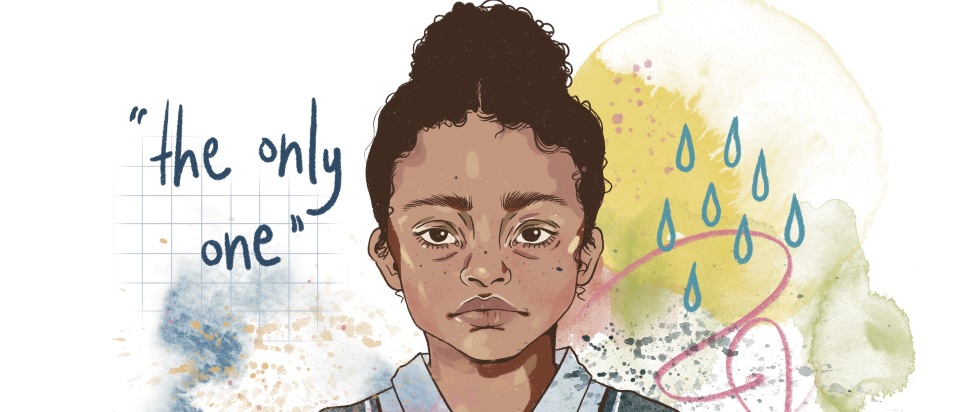Feeling Scottish: On racial and national identity
Looking to the future, one writer reflects on Scottish identity and finding joy in communities of colour
Scotland is my home, but it hasn’t always felt like home. I have lived in Greenock, a small town on the River Clyde, my whole life, and yet I haven’t found a sense of belonging until recently. My life there has been characterised by being the ‘only one’. Until my younger sister started, I was the only person with Black heritage in my primary school. Even in secondary school, there was never another Black girl in my year and I was always the only Person of Colour in my friend group.
Little microaggressions, like always being asked if I’m a tourist when there is a cruise ship in town, have made it clear to me that I’m not considered Scottish – and they undoubtedly contribute to why I don’t feel ‘Scottish’. Yes, I’m not only Scottish. I’m Guyanese too. But I’ve lived in Scotland my whole life, so I believe I should ‘feel’ Scottish.
I have always felt alienated from the ‘Scottish identity’. It’s an identity often perceived and portrayed as primarily white meaning that, in the eyes of others, my Guyanese culture and Blackness cancel out my Scottishness.
In comparison, I feel like a woman; I feel mixed race; I feel Black. I see myself in women, mixed people, and Black people because parts of their experiences mirror my own. Similarly, I see myself in the Guyanese identity. It is comforting to know that there are Guyanese people who look like me, while in Scotland very few folk seem to look like me.
For a long time my existence in Greenock was miserable. I realised my peers didn’t see me as the same type of Scottish as them, and the best survival tactic was suppressing my mixed/Black identity and Guyanese and Caribbean culture. If I didn’t talk about my culture and identity, people could almost forget that I was different. Emphasis on almost. It was exhausting holding together the palatable-to-white-people persona that I had so carefully crafted. I sat quietly in class, not sharing my thoughts on the racism and sexism of our education system, or my readings on Black British history. I locked these parts of my life away, myself my only confidant. I felt trapped.
At age 13, I began to plan my escape. As soon as I finished high school, I was off to an English city. English cities promise an ethnic diversity that Scotland’s cities simply don’t (the 2011 census found that 44.9% of the population in London was white British and 53.1% in Birmingham, compared to 78.6% in Glasgow). Images of me walking down the street and simply seeing other Black and brown faces played in my mind like a film montage. In this film, the protagonist’s deepest desire is just to feel normal for once in her life.
In hindsight, I believe this intense drive to leave Scotland was due to the lack of family and friends tying me here. I had nothing to lose by leaving and everything to gain. My Guyanese family live in the USA and we have a close relationship, despite the distance. I may always physically be present in Scotland, but mentally and emotionally I’m often elsewhere.
However, recently my tunnel vision has begun to clear. Eighteen months ago, I joined Intercultural Youth Scotland (IYS), an anti-racist charity for Black and People of Colour. IYS provides a weekly youth group in Edinburgh, with a focus on nurturing creative talent. A couple of train rides away, I found a space that affirms my identity and people who share similar cultural references and experiences. Suddenly living in Scotland wasn’t (and isn’t) so bad. I have finally found happiness, community, and opportunity here. Racism hasn’t disappeared, but it no longer feels like my survival depends on assimilation into white culture.
Subsequently, moving to England no longer feels so urgent. England still promises many things that Scotland doesn’t, but these things now come with a cost – namely, potentially losing the joy and connection I have found. What I have now is precious.
I don’t want to make a choice out of fear. IYS has taught me that I am capable of creating connections and community from the ground up. At first, I was just the new girl from an unknown town, joining a close-knit group. If I can form meaningful connections once, I should be able to do it again. For me, home is wherever I find belonging. In that sense, I have multiple homes. My home can be with my family overseas or in Scotland; it can be at IYS in Edinburgh; maybe in the future it will be in England.
While my relationship to living in Scotland has changed, my relationship to being Scottish hasn’t. I just don’t feel very ‘Scottish’. Nevertheless, I have found a strong sense of self without having a strong national identity and I am content with that.
